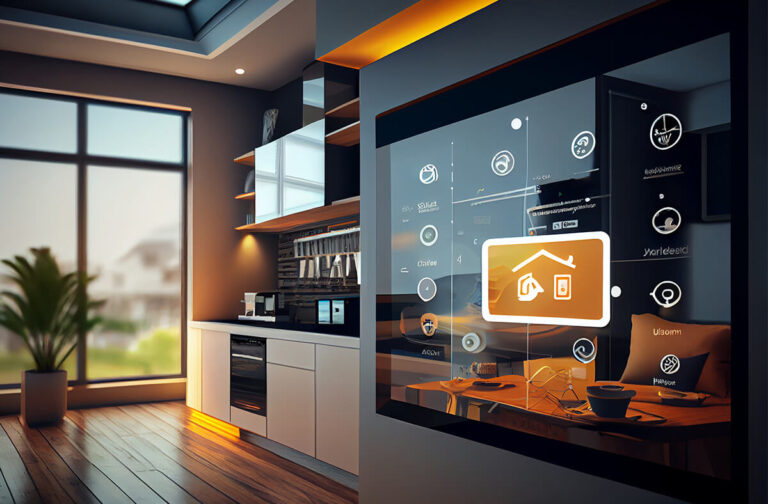What is a Technology House?
A technology house is a smart home that incorporates various forms of automation, internet-connected devices, and artificial intelligence (AI) to make everyday tasks more efficient and enjoyable. From controlling the lighting with voice commands to automatically adjusting the thermostat based on your preferences, technology houses aim to make life simpler and more comfortable.
These homes typically include devices like smart assistants (e.g., Amazon Alexa, Google Home), smart appliances, automated security systems, energy-efficient lighting, and advanced home entertainment systems. But more than just adding gadgets, the concept of a technology house involves integrating these devices seamlessly into the fabric of the home, often through a centralized system.
Key Features of a Technology House
- Home Automation At the core of a technology house is home automation, where various household functions can be controlled remotely or through pre-programmed routines. Homeowners can manage lighting, temperature, security systems, and even kitchen appliances via smartphone apps or voice commands. Automation saves time and energy, allowing you to control your house whether you’re at home or away.
- Smart Security Systems Safety is a top priority for homeowners, and technology houses offer advanced security systems equipped with cameras, motion detectors, smart locks, and facial recognition. These systems notify homeowners in real-time about any unusual activities and can even allow them to unlock doors remotely for guests or deliveries.
- Energy Efficiency Many technology houses are designed with energy-efficient features in mind. Smart thermostats, energy-saving appliances, and solar panels reduce energy consumption, leading to lower utility bills and a reduced environmental impact. Some homes even integrate rainwater harvesting and smart irrigation systems to further promote sustainability.
- Voice Control and AI Integration One of the most convenient features of a technology house is the integration of AI-powered voice control systems. Devices like Amazon Alexa or Google Assistant can control a wide range of functions in the house, from playing music to setting reminders or turning on appliances. These systems learn from user behavior and can adapt to your preferences, making your home smarter over time.
- Entertainment Systems For tech enthusiasts, a technology house also comes equipped with state-of-the-art entertainment systems. Smart TVs, immersive surround sound systems, and virtual reality (VR) setups provide a next-level media experience. In some homes, automation can extend to personalized playlists or video recommendations based on viewing habits.
The Benefits of a Technology House
- Convenience: Technology houses simplify daily routines, making it easier to manage household chores and entertainment.
- Increased Safety: Smart security systems offer enhanced protection, monitoring, and remote access to home security settings.
- Cost Savings: Automation and energy-efficient devices can lower utility bills and reduce waste.
- Eco-Friendly Living: Many technology houses are designed with sustainability in mind, using less energy and reducing the homeowner’s carbon footprint.
- Customization: Smart systems allow for highly personalized living experiences, from lighting to home entertainment, catering to each individual’s preferences.
Challenges of Technology Houses
While technology houses offer numerous benefits, they are not without challenges:
- Cost: Setting up a fully integrated technology house can be expensive, with the costs of smart devices, AI systems, and automation platforms adding up quickly.
- Learning Curve: For some, navigating the systems and getting used to new technology may take time. Older generations or those less familiar with tech may find it daunting.
- Privacy Concerns: With the rise of smart devices comes the concern of data privacy. Home automation systems often collect data on user habits, which raises concerns about how this information is used and shared.
- Reliability: Technology is not always foolproof, and malfunctions or connectivity issues can arise, leaving some smart systems inoperable at inconvenient times.
The Future of Technology Houses
We can expect more artificial intelligence, machine learning, and IoT (Internet of Things) integration, making homes even smarter and more intuitive. Augmented reality (AR) and virtual reality (VR) may eventually become a standard part of home life, further blending the physical and digital worlds
Additionally, with the growing focus on sustainability, technology houses will likely see innovations in green technology, such as renewable energy sources, smart water management systems, and more efficient building materials.
Conclusion
A technology house represents the future of living—one where convenience, safety, and sustainability are at the forefront. As more homeowners adopt these innovations, the traditional house as we know it will transform into a fully integrated, automated environment that meets the needs of modern life. While there are challenges to overcome, the potential for a more connected, energy-efficient, and intelligent home is truly exciting.
Read More : The Button UIISII TWS-P01 earbuds excel in connectivity.



